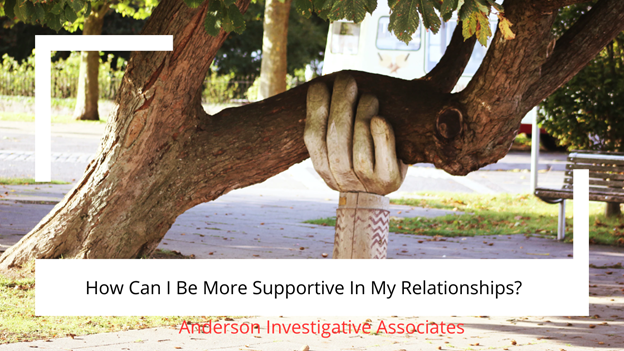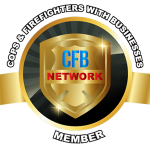
“You cannot have a positive life and a negative mind.”
– Joyce Meyer –
In interview training we talk frequently about building rapport and establishing commonality as tools to build relationships with those we are interviewing. Much like in that arena, building strong and supportive relationships in interviews and life involves a blend of effective communication, empathy, and understanding.
Do you feel like you aren’t supportive enough of your colleagues or friends? Or maybe of your significant other? Being supportive in any sort of relationship is an important part of maintaining that relationship in a healthy status. This is especially true in those intimate relationships in your life. Being supportive in your relationships is crucial for maintaining healthy and positive connections with others. Here are some strategies to be more supportive:
- Check-In Frequently
Everyone has that one friend they haven’t heard from in a while. But the phone and internet work two ways. Don’t be afraid to message or call your friends to check-in. After all, they may be in dire need of support and may just have been too busy to reach out to you. You never know until you check. And even if you live with your significant other, it’s important to ask how their day was because they may not volunteer information that is bothering them until you ask.
- Just Listen
Sometimes, you may reach out to a friend and find that they need to vent about some things going on in their life for a few minutes. And the best way you can help this friend or significant other is just by sitting quietly and listening to their problems. If they want advice or help, you can offer it, but even the most put-together people just need to vent now and then. Take the time to care.
- Help Lower Their Stress
Although you may not solve a problem or situation your colleague may be facing, this doesn’t mean you can’t help lower their stress in other areas of their life. For example, if your husband or wife is experiencing a lot of stress at work, maybe take on a few of their household duties so that when they come home in the evening, they can just relax. You can also do something simple but nice for those in your life. Pick up an area of responsibility, volunteer for an assignment, anything which will lower their stress if even just for a few minutes.
These three suggestions are just a start to having a focus of caring and concern for those around you. To be effective use some of the same tools we teach to excel at interviewing, which too is a communication skill:
- Active Listening: Emphasize the importance of active listening during interactions. Encourage individuals to fully engage in conversations, ask open-ended questions, and show genuine interest in what the other person is saying.
- Empathy and Validation: Learn to be focused on acknowledging and validating others’ feelings and perspectives. Empathy helps build trust and understanding in relationships, making individuals feel heard and valued.
- Nonverbal Communication: Consistent with our interest in human interaction, be aware of the significance of nonverbal cues such as body language, facial expressions, and tone of voice. These cues often convey emotions and intentions that words alone might not capture. Don’t be afraid to address concerns.
- Open and Honest Communication: Share techniques for expressing thoughts and feelings openly and honestly, while also encouraging others to do the same. Transparent communication fosters a sense of authenticity and reduces misunderstandings.
- Conflict Resolution: Adapt techniques consistent with interviewing for resolving conflicts. We must address disagreements calmly, focusing on understanding the root causes and finding mutually agreeable solutions.
- Asking Effective Questions: Leverage your experience to emphasize the art of asking thoughtful and probing questions. This can help individuals delve deeper into conversations and gain a better understanding of others’ perspectives.
- Mindful Presence: Highlight the importance of being present in the moment during interactions. Mindfulness can enhance connection and create a sense of comfort and safety in relationships.
- Appreciation and Gratitude: Encourage people to express appreciation and gratitude for one another. This fosters a positive atmosphere and reinforces the bond between individuals. Don’t be afraid of saying thank you.
- Boundaries and Respect: Discuss the significance of setting and respecting personal boundaries in relationships. This helps maintain a healthy dynamic where both parties feel comfortable and valued.
- Continuous Learning: We are never done. We must openly promote the idea of continuous self-improvement in relationships. Encourage individuals to seek out resources, workshops, and discussions that enhance their interpersonal skills.
This list is useful where in our lives? Everywhere. Those treasured relationships, work interactions, with friends, and in the world of interviewing. Be consistent. Practice them continuously.
Conclusion
Being supportive in all of your relationships is no easy task. But you can start by checking in with your friends and significant other frequently, listening to them when they need it, and lowering their stress in any way possible. Not only will this improve your relationship with that individual at the current time, but it will also strengthen the relationship for years to come.
In this work and world, we should be focused on building and maintaining relationships. We are built for interaction, socialization, and relationship, plus if you are in our shared profession, it is a precursor for continued success. No matter how difficult it is for us, if we recognize it as essential and part of our mission, we will endeavor to succeed at it.
Anderson Investigative Associates is positioned to custom-tailor training to your specific needs. If you have any questions or would like to discuss the above issues of supporting relationships, or any training need, please reach out. Additional issues pertaining to interviewing, auditing, and investigations can be found in other blogs and videos that I have produced and are contained in most blocks of instruction that our company presents.
If you have additional questions, comments, or have an interviewing topic you would like me to address, give me a shout. In the meantime, be well, stay safe out there, and get busy strengthening those around you through relationship building.
Mark A. Anderson
Director of Training and Development
Anderson Investigative Associates, llc
114 Loucks Avenue
Scottdale, PA 15683
manderson@andersoninvestigative.com
tel:912-571-6686
.
